|
|
|
Sort Order |
|
|
|
Items / Page
|
|
|
|
|
|
|
| Srl | Item |
| 1 |
ID:
193583
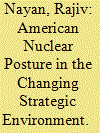

|
|
|
|
|
| Summary/Abstract |
On 27 October 2022, the much-awaited Nuclear Posture Review (NPR) of the United States (US) was released in a declassified form, but not as an independent document as it had been issued in the past. It was part of the National Defense Review (NDR) of 2022, as it formed part of a single document comprising the NPR, NDR and The Missile Defense Review (MDR). The NDR of 2022 had assigned four priorities to strengthen America’s deterrence prowess. These priorities are as follows: protecting the homeland, deterring strategic attacks, prevailing in the conflict, and creation of a ‘resilient joint force and defence ecosystem’.
|
|
|
|
|
|
|
|
|
|
|
|
|
|
|
|
| 2 |
ID:
193586
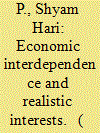

|
|
|
|
|
| Summary/Abstract |
The perception of conflicts between explicit political actors such as nation-states has an interesting peculiarity over its manifestation. When visible violent outbursts of conflict are absent, the international community often becomes optimistic and tends to envision a world matured from past failures (read conflict). This image is not formed by discounting the elements of latent conflict but is often built on the conviction that economic interdependence is infallible. The interdependence is understood to be such that, in a globalized world, often the perils—spillover effect of wars and the imposition of sanctions—deter conflict actors from engaging in one, and if engaged, not prolonging it. However, time and again, the repulsion between potential carnage and sanctions seems least effective. The international community is often taken off-guard by conflictual events that make them ponder if economic interdependence promoted through globalization is a true factor in preventing wars.
|
|
|
|
|
|
|
|
|
|
|
|
|
|
|
|
| 3 |
ID:
193579


|
|
|
|
|
| Summary/Abstract |
The Himalayan region is renowned as a powerhouse of Asia. Despite its abundant natural resources, youthful population, and strategic location between two rapidly developing Asian economies, the social and economic conditions in the Himalayan region, particularly in Nepal and Bhutan, have remained consistently underdeveloped. Various factors contribute to this, including climate change-induced disasters, political instability, strained bilateral relations between lower and upper riparian countries, and inadequate resource management. This article aims to address the existing research gap by exploring the energy potential of the Himalayan region and its viability for sustainable economic growth in the face of increasing global temperatures and climate-induced energy crises. The article asserts that, unless the region diversifies its energy sources to include other renewables, the Himalayan region (comprising Nepal, Bhutan, and the Indian Himalayan States-IHS) may not be able to serve as a stable hydro energy supplier to the South Asian region. This is due to inherent challenges and the strategic competition between India and China, both regionally and globally.
|
|
|
|
|
|
|
|
|
|
|
|
|
|
|
|
| 4 |
ID:
193581
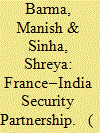

|
|
|
|
|
| Summary/Abstract |
With France’s support to the Indian vision of ‘Atmanirbhar Bharat’, defence industrialization and joint development, India and France have expanded their strategic security relations significantly. Such developments point towards convergence in matters of regional and global consequence. The first part of the article examines the historical background of military ties as well as cooperation on non-traditional security threats. The second part attempts to examine the evolving France–India relations in the wake of Chinese aggression along with their engagement in the Indo-Pacific region. The concluding third part extrapolates the findings on to the future to study the challenges to their partnership.
|
|
|
|
|
|
|
|
|
|
|
|
|
|
|
|
| 5 |
ID:
193582
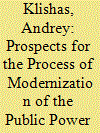

|
|
|
|
|
| Summary/Abstract |
The development of society provides for constant changes in the axiological foundations of legal regulation within the State. The Constitution, on the other hand, acts as a fundamental document that forms the basis of relations between the cells of society, taking into account current values. Based on the study of the world experience in constitutional construction, a conclusion is made about the presence of a general trend in the replenishment of the value catalogue of Constitutions, taking into account the historical experience accumulated by States and national priorities. The article discusses the process of improving the organization of the State power system in the context of constitutional reforms on the example of Russia and others Commonwealth of Independent States (CIS) countries and some European countries in recent years. It concludes that the conditions improving the efficiency and consistency of the entire public administration system in the countries under consideration have unconditionally formed due to ongoing constitutional reforms that have updated the system of social relations. The subject of the study are the constitutional amendments in the countries under study, mainly in the context of changes in the model of functioning and interaction of the higher State authorities.
|
|
|
|
|
|
|
|
|
|
|
|
|
|
|
|
| 6 |
ID:
193580
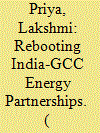

|
|
|
|
|
| Summary/Abstract |
The Gulf Cooperation Council (GCC) States have over the decades proved to be dependable partners in India’s energy security. However, the energy transition necessitates examining its impact on the India-GCC energy partnership. Will India-GCC energy partnership last the transition from hydrocarbons to renewables? What will be its medium- and long-term impact? Can hydrogen replace hydrocarbons as the vehicle for India-GCC energy cooperation? This article answers some of these questions based on a systematic study of innovation in the field of hydrogen as a fuel, India’s National Green Hydrogen Mission and the growing investments in capacity building in hydrogen production in the GCC States.
|
|
|
|
|
|
|
|
|
|
|
|
|
|
|
|
| 7 |
ID:
193585
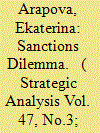

|
|
|
|
|
| Summary/Abstract |
International sanctions affect international trade significantly. They lead to a decrease in the trade flow between the sender and the targetFootnote1; when the political relationship is strained, it can negatively affect trade flows.Footnote2 Moreover, the threat of economic sanctions may be even more important than the actual imposition.Footnote3 The anticipation effect may bring controversial results for both the sender–target interactions and the target’s relations with the third countries. On the one hand, political and diplomatic tensions increase the exposure of international firms to political and credit risk and encourage them to temporarily delay trade. Footnote4 On the other hand, the threat of sanctions can act as an incentive for potential targets to stockpile against future negative effects of sanctions and result in short-term positive effects.Footnote
|
|
|
|
|
|
|
|
|
|
|
|
|
|
|
|
|
|
|
|
|